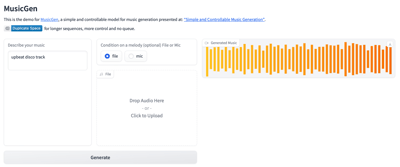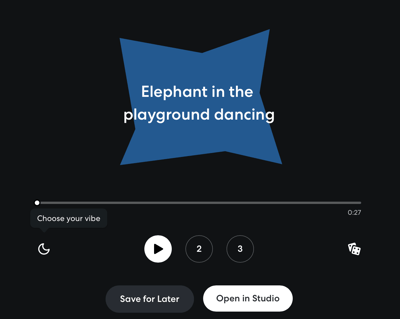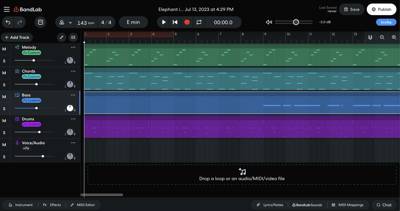
As the AI revolution continues, we are discovering more and more ways that artificial intelligence can change the way that we create music.
Meta has recently launched a demo version of MusicGen, which can create songs for free using text prompts or with the addition of vocal samples and ideas.
For some, this may feel like a frightening time. As musicians such as Sting warn against a battle between machines and human creatives, it begs the question: is it worth starting out as a musician?
If a machine can create melodies in nanoseconds, will songwriters become a thing of the past?
Will the composers of tomorrow be the musicians starting out...or will they be AI music generators?
At pBone Music, we want to bring the joy of music to all children. We understand that artificial intelligence and rapid advances in technology might feel like threats to creating music. But we are investigating how artificial intelligence can benefit musicians.
We have already looked at the ways that AI can teach music and how we can use ChatGPT to help with our practice. But can we use AI to write music with children in mind? Can tools like MusicGen teach children to compose? Or shall we all stop trying and let bots do the scoring for us?
How does an AI music generator work?
Generators such as MusicGen use code that is trained using music...lots of music. MusicGen was reportedly fed around 20,000 hours of music, including 10,000 hours of library music and 390,000 individual instrument tracks.
The music generator can then be fed a text prompt - such as "upbeat disco track" - and a short snippet of music can be created. In the case of MusicGen, this is a twelve-second piece of music.
Different generators have different features. MusicGen can use file uploads created by the user or even mic recordings to craft a more bespoke audio experience.
Using MusicGen to create musical ideas for children
Here are some examples of using MusicGen to create music using text prompts.
For the first example, let's ask for our "upbeat disco track". This is a general prompt, so should give us a sense of what MusicGen can do. Remember, this is a free service. There are other generators out there but some may require a paid subscription to access.

The example worked pretty well. A child could use this tool to find examples of different genres, to see how they compared to popular disco tracks.
But when we add more complex instructions into MusicGen, the results are not quite as pleasing to the ear.
Entering the prompt "Harry Styles pop track with a melodic bassline and handclaps, 120 BPM" leaves us with a rather, well, robotic song. It did manage to produce music that was 120 BPM, but the bassline and chord progression were not very pleasant to listen to. Harry, your job isn't going anywhere yet!
MusicGen is an interesting tool, but it is a long way from some of the AI experiments seen in the media, where popular vocalists are reimagined using technology.
How can we use AI to teach children about composing music?
In the same way that ChatGPT will not instantly make you a celebrated author, tools like MusicGen will not take you from A to Zimmer in a matter of seconds.
Engaging with these tools while teaching children about music can be useful. For example, rhythm and pitch can be explored and tested using text prompts, as opposed to relying on other musicians or learning resources.
Generators can also be a chance for children to learn about composing and improvising. Google has produced A.I. Duet, a tool that allows users to play notes on a virtual keyboard before AI responds with a piano line.
As ChatGPT can be used by experienced writers and marketers (ahem) to craft articles, music generators can also be used as a starting point for ideas. BandLab has created SongStarter for this purpose.
Users can either select a popular musical genre or type in a lyrical idea to instantly generate three musical snippets. Unlike MusicGen, there is less control over what the musical output will be, but the results sound more consistent. The lyrical prompt "Elephant in the playground dancing" produced some fun examples of what AI can quickly piece together.

Best of all, children can click the "Open in Studio" button to launch this initial idea into BandLab's free, online music creation software.
From one simple idea, children can soon get to grips with using a DAW (Digital Audio Workstation) to create beats, melodic ideas and craft a polished pop song.
We will further explore how BandLab can be used by children to make their own masterpieces, but SongStarter is a fun way to turbocharge inspiration and take some first steps into the world of AI music generation.

What is next for AI music generation and children learning to compose?
Music generated by artificial intelligence is in its infancy. Many of the concerns around its use centre on copyright issues from artists.
For children learning to create music for the first time, music generators can be explored as a launchpad for new ideas. Sparking inspiration or satisfying curiosity with a text or recorded prompt could potentially lead to interesting results. As technology improves, this process could become even more natural.
Crucially, musical understanding and a creative disposition are still needed to craft these potential sparks into something that sounds great. MusicGen and SongStarter may not be replacing songwriters, but they could help the next generation of composers create even more music in the future.
- Check out our article to learn more about AI music teaching tools.
- Think ChatGPT is just for lazy content writers? Think again (please). Check out our guide to using ChatGPT in music.
Adam is the Content Manager at pBone Music. This should mean that he’s the ideal person to write about himself, but he finds boasting in the third person a little awkward. He honed his word wizardry with a degree in English Language and Literature at the University of Leeds. He has since written copy for clients and businesses across the land, from awards to something beginning with “z”. He also spent a number of years as a musician. He has written pop songs and even jingles for kids, performed more first dances at weddings than you could shake a pBuzz at, and once played a gig for a pie company at The Etihad Stadium in Manchester. When he’s not reminiscing about those good old days, you might find Adam enjoying the football (although as an Everton fan, that can be difficult). He also loves spending time with his partner, Jen, and his family and friends, and sincerely hopes they feel the same way.
Topics: